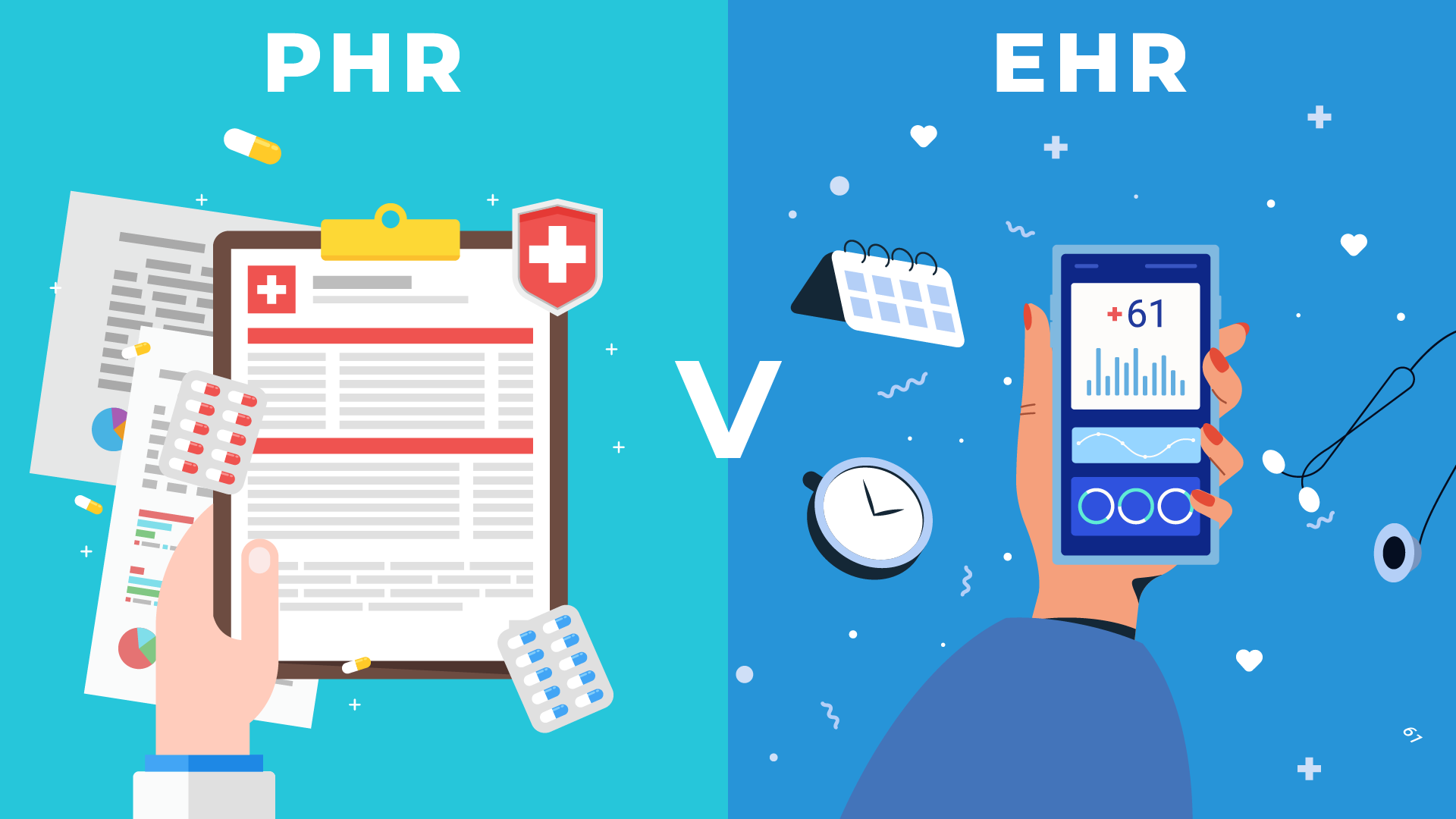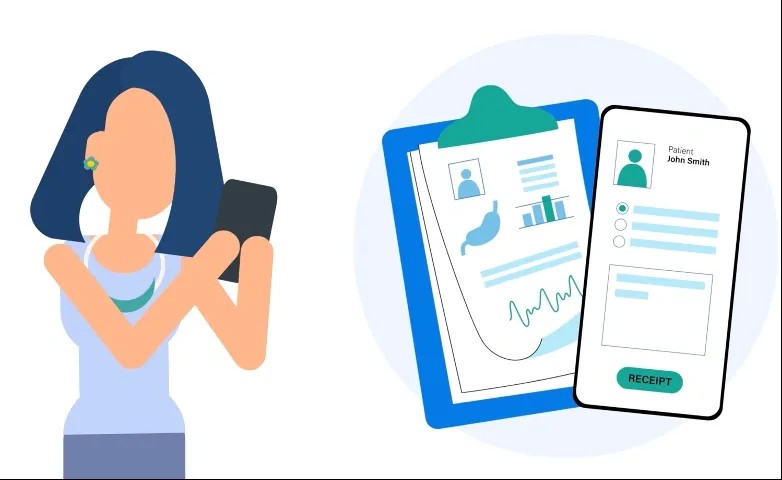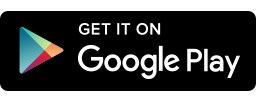Of late, digital health records, such as Personal Health Records (PHR) and Electronic Health Records (EHR), are seeing a significant increase in adoption. The reason is simple: digital health records are super convenient. Why go through the trouble of organizing paper prescriptions, doctor’s notes, lab results and other health record paraphernalia when you can simply transfer this information online? Managing this online makes accessing your medical records seamless, allowing you to quickly share or pull up your medical records without fumbling with a stack of files or searching for records that are already lost.
The terms PHR and EHR are often used interchangeably. While similar in function, they differ in accessibility, ownership and uses. To give you clarity on what PHR and EHR mean and their use cases, we’ve put down a comprehensive guide below
What is a Personal Health Record (PHR)?
Most of us are guilty of coming home after a doctor’s appointment and sliding our prescriptions under shelves to promptly forget about it. Sometimes, we carelessly throw out test reports/imaging results into the bin, thinking they’re no longer relevant. When your healthcare provider asks to review your old health records, there’s nothing to show. This could potentially cause more harm than you realize. Your medical records contain valuable information – information that is crucial for your well-being. Since we are prone to forgetfulness or do not hhttps://ayamahealth.com/ave the time to organize our medical records, digitizing them via a PHR app could be beneficial in several ways.
So, What is a PHR?
A PHR is a digital repository (like an app) where patients can exclusively store and maintain medical and health records. You can upload prescriptions, test reports, imaging results, allergy information, and family history. Your PHR can also record pre and post-treatment updates. It can monitor vital functions like blood sugar, heart rate, oxygen levels, blood pressure, menstrual cycle, and more with data from synced third-party apps like Fitbit and Apple Watch.
You can even share your data via PHR with healthcare professionals such as doctors for second opinions and online consultations. With PHR apps, you can even check when you are due for follow-ups. Since PHRs store sensitive information, they are securely engineered to protect your data from malicious or external exposure.
With a PHR app, you are actively involved in managing your health.
Electronic Health Record (EHR)
Imagine this: you are seeking treatment from two specialist doctors for different issues simultaneously. As a general rule, doctors review your current medication to offer you a treatment plan that does hinder other ongoing treatments. In such situations, doctor’s notes (not shared with patients) can offer your specialists a complete picture of all your health conditions. However, doctor’s notes can be shared only on request by other healthcare providers or with an EHR system.
EHRs are similar to PHRs, but they differ in who maintains a patient’s digital health records. EHRs are exclusively maintained by healthcare providers. Healthcare providers can create, share and manage your health records across not just departments within a hospital but with a network of approved healthcare providers and professionals. They can log all patient health records in an EHR: medical prescriptions, doctor’s advice, doctor’s notes, lab results, imaging reports, surgery notes, and current treatment plans.
A comprehensive patient health record across specializations can help healthcare providers prescribe the best treatment plan. During emergencies, when a person is unconscious and cannot offer their medical history, healthcare professionals can log onto the EHR and quickly review the patient’s medical and health history. Healthcare professionals can even schedule follow-ups based on the data collected by the EHR. EHR is, therefore, a digital health record system that is patient-centric, comprehensive and easily accessible by all healthcare providers.
A Quick Recap: Here’s How PHR and EHR Differ
Ultimately, the goal of any robust PHR and EHR system is the same: store and maintain the health records of a patient. PHRs and EHRs are convenient to the end-user because they remove the need for manual storage and extensive paper records while easing shareability to healthcare professionals.
Let’s go through the differences once again:
|
Parameter |
Personal Health Record (PHR) |
Electronic Health Record (EHR) |
|
Ownership |
Uploaded, retained and managed by patients |
Uploaded, retained and managed by more than one healthcare provider, such as hospitals, doctors, pharmacies, diagnostic centers, etc. |
|
Used By |
Patients |
Healthcare professionals |
|
Vital Functions Monitoring |
Monitor vitals like blood sugar, blood pressure, oxygen levels, heart rate, menstrual cycle, etc. |
Cannot monitor vitals |
|
Accessibility |
Patients can access their data, such as prescriptions, lab results, and imaging results. |
Includes confidential notes from doctors exclusive to the provider, as well as prescriptions and lab/imaging reports |
|
Examples |
Ayama, Abha Health Locker, Eka Care |
AdvancedMD, athenahealth, Cerner |
The Relevance of Digital Health Records Today
Digital health records like PHR and EHR are crucial in today’s digital-forward lifestyle. Integrating your health records in a PHR app allows you to stay on top of important medical details. PHR apps ensure the active involvement of patients in their health and offer healthcare practitioners insight into patient health outside of clinical and medical treatments.
Ayama Health is one of the best PHR apps, designed to organize your medical records with ease. The app is user-friendly, ensuring effortless navigation. Furthermore, it is highly shareable and customizable, allowing you to share your medical data with physicians and create profiles for family members with just a few clicks. Ayama Health helps you monitor vitals like blood pressure, blood sugar, weight, menstrual cycle, and more.
Take charge of your health today and download Ayama Health here




